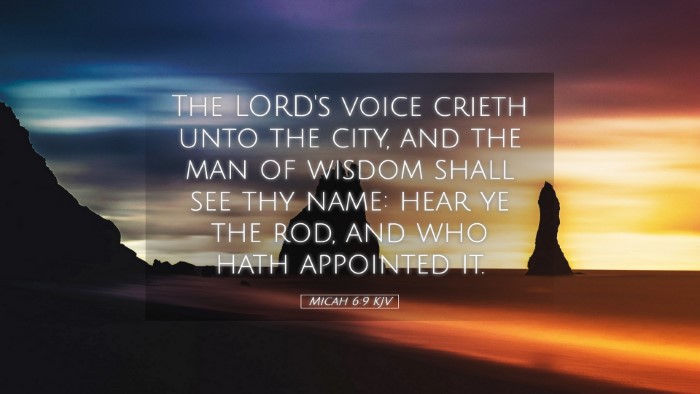Old Testament
Genesis Exodus Leviticus Numbers Deuteronomy Joshua Judges Ruth 1 Samuel 2 Samuel 1 Kings 2 Kings 1 Chronicles 2 Chronicles Ezra Nehemiah Esther Job Psalms Proverbs Ecclesiastes Song of Solomon Isaiah Jeremiah Lamentations Ezekiel Daniel Hosea Joel Amos Obadiah Jonah Micah Nahum Habakkuk Zephaniah Haggai Zechariah MalachiMicah 6:9
Micah 6:9 KJV
The LORD's voice crieth unto the city, and the man of wisdom shall see thy name: hear ye the rod, and who hath appointed it.
Micah 6:9 Bible Commentary
Commentary on Micah 6:9
Verse: Micah 6:9 - "The Lord's voice crieth unto the city, and the man of wisdom shall see Thy name: hear ye the rod, and who hath appointed it."
This verse encapsulates a potent message delivered by the prophet Micah, inviting the attention of the people to the reality of divine judgment and the need for repentance. It speaks to the importance of recognizing the signs and warnings given by God.
Contextual Overview
The book of Micah addresses the social injustices present in Israel, exposing the moral decline of the nation. Micah, a contemporary of Isaiah, prophesied during a time of political upheaval and spiritual decay. His warnings and proclamations call the people back to covenant faithfulness.
Exegesis and Insights
- Divine Voice: Micah begins the verse by depicting the voice of the Lord as a cry to the city. This invocation is significant; it implies urgency and the imperative for the people to respond. Matthew Henry notes that God's voice is both a call to repentance and a declaration of impending judgment.
- The Man of Wisdom: Micah declares that "the man of wisdom shall see Thy name." Albert Barnes comments on this statement by highlighting that true wisdom involves recognizing God's sovereignty and adhering to His commandments. Wisdom is portrayed not merely as knowledge but as actionable understanding of divine principles.
- Hearing the Rod: The phrase "hear ye the rod" reflects a call to heed the chastening of the Lord. Adam Clarke emphasizes that the rod symbolizes God's discipline. It signifies a warning that divine correction is intended for the moral restoration of the people, rather than mere punishment.
- Who Hath Appointed It: This part of the verse prompts reflection on the sovereignty of God in administering justice. It underscores the sentiment that punishment is not arbitrary but is divinely appointed. Therefore, recognizing who appoints the rod emphasizes accountability to God.
Theological Implications
- Divine Judgment and Mercy: Micah's message encapsulates the balance of God's justice and mercy. While judgment is pronounced, there is an underlying hope for repentance and restoration. The presence of the rod brings the potential for correction and renewal.
- Call to Wisdom: This passage exhorts adherents to cultivate wisdom through an understanding of God’s character. True wisdom is found in reverence for God's name and obedience to His guidance. Both Barnes and Clarke agree on the importance of seeking wisdom that leads to righteous living.
- Importance of Hearing: The collective call to "hear" implies that spiritual discernment is required not only for individual believers but as a communal responsibility. In recognizing God’s dealings through the rod, every member of the community is prompted to self-examination and correction.
- Responsibility of Leadership: Pastors and leaders are reminded of their duty to proclaim the truth, to call for repentance, and to lead by example in wisdom. Micah's call can serve as a model for shepherding God's people in truth and humility.
Practical Applications
The insights derived from Micah 6:9 can guide pastors, theologians, and students toward practical applications:
- Self-Reflection: Individuals are encouraged to evaluate their own lives in light of God’s word. Where is God’s rod pointing out areas of life needing correction?
- Community Accountability: The church is invited to engage in communal repentance and accountability, recognizing that they are collectively responsible for upholding God’s standards.
- Bold Proclamation: As leaders, the call to “cry out” should empower pastors to boldly proclaim truth, speaking to issues of justice and morality within their communities.
- Pursuit of Wisdom: In a world of competing voices, the pursuit of Godly wisdom through studying His word is vital. This involves seeking to understand the character of God and applying it in practical ways.
Conclusion
Micah 6:9 holds profound truths that challenge and encourage the faithful. The duality of divine judgment and the hope for repentance remind believers of the necessity of alignment with God’s will. It is a clarion call for wisdom, repentance, and an acknowledgment of God’s providential care amidst discipline.


